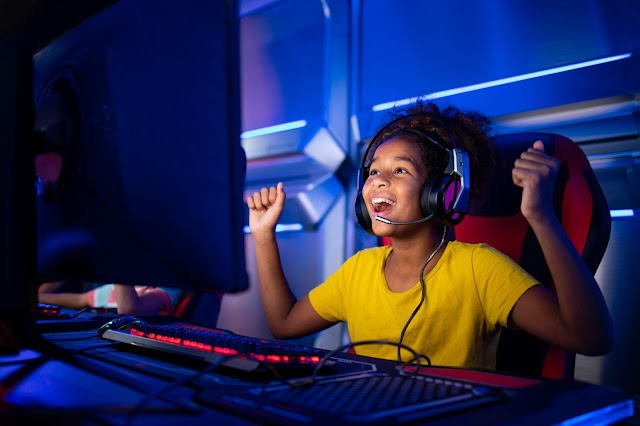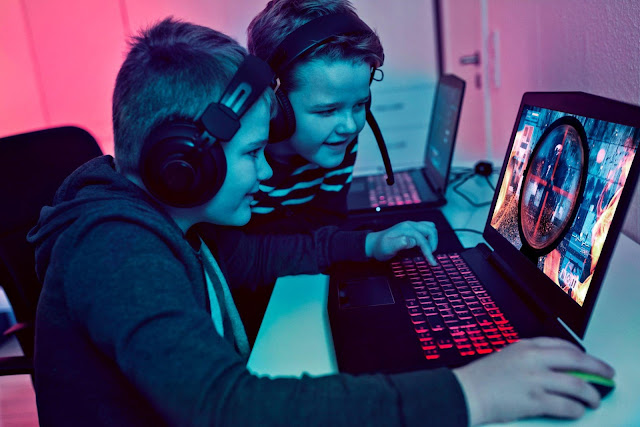In today's digital age, gaming has become an increasingly
popular form of entertainment for people of all ages, including kids. However,
as a parent or guardian, it is crucial to ensure that the games your children
play are age-appropriate and provide a safe and enriching experience. This
article will guide you through the process of finding suitable games for young
players, taking into consideration their age, interests, and learning needs.
Introduction
In the ever-evolving world of gaming, it is essential to
navigate the vast array of options and make informed decisions about the games
your children play. This article will provide you with valuable insights and
practical tips to help you find age-appropriate games that are not only
entertaining but also educational and safe for your young players.
Understanding Age Ratings
To ensure you choose games suitable for your children's age
group, familiarize yourself with age ratings provided by organizations such as
the Entertainment Software Rating Board (ESRB) or Pan European Game Information
(PEGI). These ratings categorize games based on content, including violence,
language, and mature themes.
Researching Game Content
Before allowing your child to play a particular game, take
the time to research its content. Visit official game websites, read
descriptions, watch gameplay videos, and review user comments to gain a
comprehensive understanding of what the game offers and whether it aligns with your
child's values and interests.
Evaluating Gameplay Mechanics
Consider the gameplay mechanics of a game to ensure it is
suitable for your child's skill level and preferences. Some games may require
complex motor skills, quick reflexes, or strategic thinking, while others focus
on creativity or problem-solving. Look for games that strike a balance between
challenge and enjoyment for your child.
Exploring Educational Games
Gaming can offer educational benefits, making it a valuable
tool for children's learning and development. Look for games that promote
problem-solving, critical thinking, creativity, or educational subjects such as
math, science, or language. These games can enhance your child's cognitive
skills while providing an enjoyable experience.
Considering Multiplayer Options
If your child enjoys playing games with friends or siblings,
consider games with multiplayer features. Multiplayer games allow children to
engage with others in a controlled and moderated environment, promoting social
interaction, teamwork, and communication skills.
Parental Controls and Online Safety
Ensure your child's safety while gaming by utilizing
parental controls and monitoring features provided by gaming platforms. Set up
age restrictions, time limits, and content filters to protect your child from
inappropriate content and online interactions. Regularly discuss online safety
with your child and encourage open communication.
Balancing Screen Time
While gaming can be an enjoyable activity, it's crucial to
maintain a healthy balance between screen time and other activities. Establish
clear rules regarding the duration of gaming sessions and encourage your child
to participate in physical exercise, outdoor play, and other hobbies to promote
a well-rounded lifestyle.
Encouraging Offline Play
While digital gaming offers many benefits, it is equally
important to encourage offline play. Engaging in physical play, reading books,
or pursuing creative hobbies can stimulate imagination, foster social skills,
and provide a break from screen time.
Engaging with the Gaming Community
Participate in the gaming community to stay informed about
the latest trends, updates, and recommendations. Connect with other parents,
join online forums or social media groups dedicated to gaming for kids, and
exchange valuable insights and experiences.
Involving Children in Decision
Making
Involve your children in the process of selecting games.
Discuss their preferences, read game reviews together, and consider their
opinions. By including them in decision-making, you empower them to make
informed choices and develop critical thinking skills.
Introducing Gaming Platforms for
Kids
Several gaming platforms offer a curated selection of games
specifically designed for children. Explore platforms like Nintendo's Switch,
PlayStation's PlayLink, or educational platforms like LeapFrog to discover
age-appropriate games tailored to your child's needs.
Utilizing Reviews and
Recommendations
Take advantage of online reviews and recommendations from
trusted sources. Websites and publications specializing in family-friendly
gaming content can provide insights into the quality, educational value, and
appropriateness of games for young players.
Setting Rules and Boundaries
Establish clear rules and boundaries regarding gaming,
including designated playtime, appropriate game genres, and behavioral
expectations. Communicate these rules effectively to ensure a healthy gaming
experience for your child and minimize conflicts.
Conclusion
Finding age-appropriate games for young players requires
careful consideration and research. By understanding age ratings, evaluating
game content and mechanics, utilizing parental controls, and involving your
children in decision-making, you can create a safe and enriching gaming
environment that aligns with their interests and fosters their growth.
FAQs
Q: How can I
determine the age rating of a game?
A: Age ratings can usually be found on the game's packaging
or in online stores. Look for labels provided by organizations like ESRB or
PEGI.
Q: Are all
educational games enjoyable for kids?
A: While educational games aim to combine learning with fun,
preferences may vary. Consider your child's interests and involve them in the
selection process.
Q: Can gaming have
positive effects on children?
A: Yes, gaming can enhance cognitive skills, promote
problem-solving, and improve hand-eye coordination. However, moderation and
age-appropriate content are crucial.
Q: How can I ensure
my child's safety while gaming online?
A: Use parental controls, educate your child about online
safety, and monitor their interactions. Encourage open communication and report
any concerning incidents.
Q: Are there gaming
platforms designed specifically for young children?
A: Yes, platforms like Nintendo's Switch or educational
platforms like LeapFrog offer a selection of games tailored to the needs and
interests of young players.
.jpg)













Comments
Post a Comment